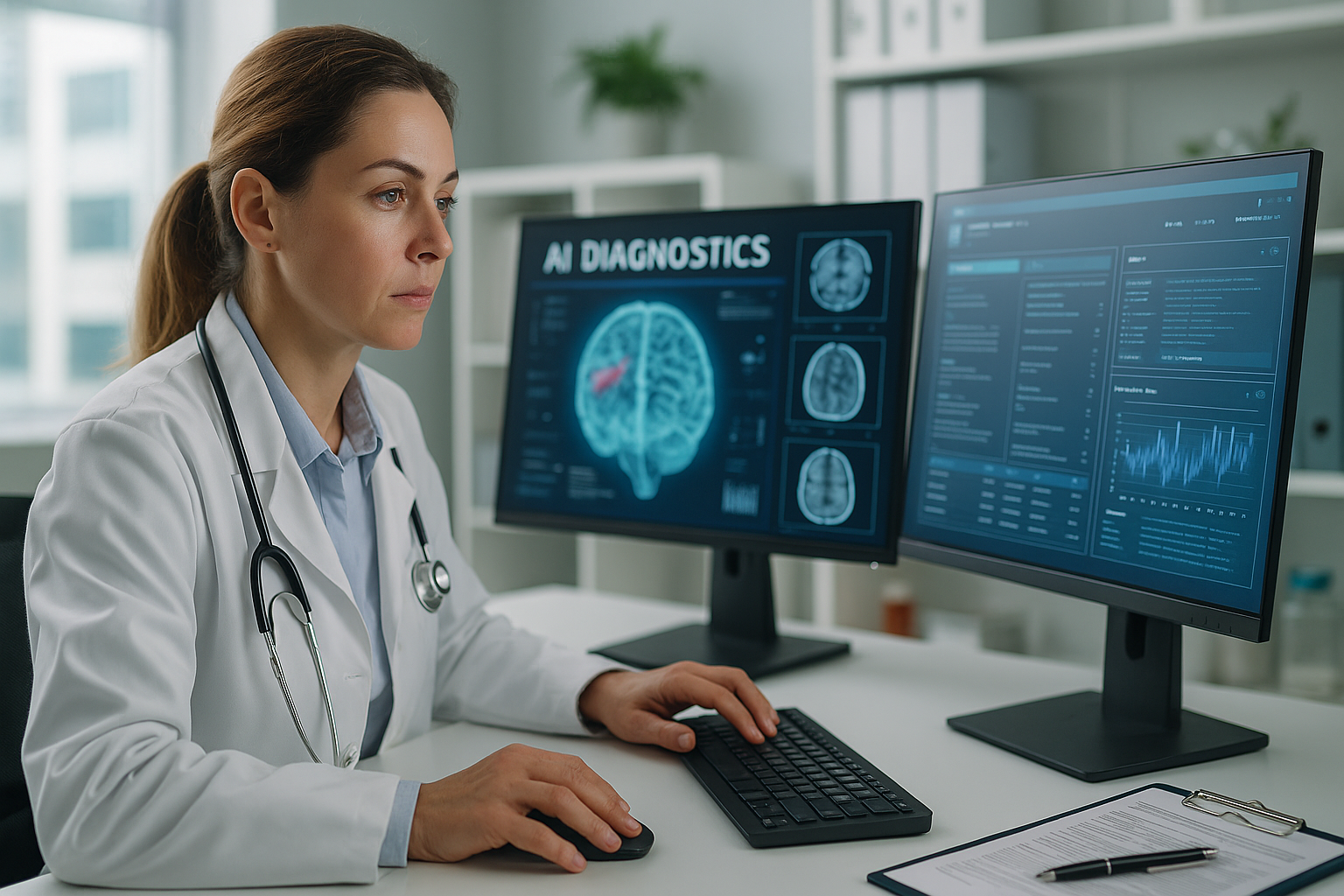The healthcare industry is undergoing a profound transformation — and at the heart of this revolution is Artificial Intelligence (AI). From improving diagnostics to predicting disease outbreaks, AI is not only enhancing medical outcomes but also reshaping how care is delivered.
This article explores how AI is being used in healthcare today, the challenges it presents, and what the future holds for AI-driven medicine.
What Does AI in Healthcare Mean?
AI in healthcare refers to the use of machine learning algorithms, data analytics, and automation tools to assist medical professionals in tasks that require intelligence, such as:
- Diagnosing diseases
- Monitoring patients
- Personalizing treatments
- Managing hospital logistics
- Discovering new drugs
Rather than replacing healthcare providers, AI is increasingly viewed as a partner in delivering faster, more accurate, and more efficient care.
Real-World Applications of AI in Healthcare
1. Medical Imaging and Diagnostics
AI systems like Google’s DeepMind and IBM Watson are being trained to analyze X-rays, MRIs, and CT scans with remarkable accuracy — sometimes rivaling or surpassing human radiologists.
Benefits include:
- Early detection of cancer and other diseases
- Faster processing of medical images
- Reducing human error in diagnoses
2. Predictive Analytics
By analyzing patient records and medical histories, AI can forecast:
- The likelihood of readmission
- Risk of chronic conditions (like diabetes or heart disease)
- Disease progression over time
Hospitals are using predictive models to identify high-risk patients and intervene sooner.
3. Virtual Health Assistants and Chatbots
AI-powered chatbots like Ada Health or Babylon can:
- Conduct initial symptom checks
- Guide patients on next steps
- Provide follow-up reminders and medication alerts
These tools reduce the load on healthcare staff while improving patient engagement.
4. AI in Surgery
Robotic systems such as the da Vinci Surgical System use AI to assist surgeons during operations. While the robot doesn’t make decisions, it enhances precision, reduces invasiveness, and speeds up recovery.
AI also plays a role in:
- Preoperative planning
- Intraoperative monitoring
- Postoperative risk analysis
5. Drug Discovery and Development
Traditionally, developing new drugs takes years and billions of dollars. AI accelerates this process by:
- Identifying promising compounds
- Simulating molecular reactions
- Predicting side effects
AI tools helped researchers speed up COVID-19 vaccine development and continue to aid in the fight against rare and complex diseases.
6. Personalized Treatment Plans
Using data from genetics, lifestyle, and treatment history, AI can tailor therapies to individual patients. This is especially important in areas like:
- Oncology (personalized cancer therapies)
- Mental health (behavioral pattern analysis)
- Neurology (tracking progress in diseases like Alzheimer’s)
Benefits of AI in Healthcare
- Faster decision-making
- Improved diagnostic accuracy
- Reduced medical errors
- Lower administrative burden
- Enhanced patient experiences
Challenges and Limitations
Despite its potential, AI in healthcare also faces major hurdles:
1. Data Privacy and Security
AI systems require access to vast amounts of patient data, raising concerns about:
- Data breaches
- Consent
- Compliance with regulations like HIPAA or GDPR
2. Bias in AI Models
If AI is trained on biased or non-representative data, it can lead to:
- Misdiagnosis in underrepresented populations
- Inequities in treatment recommendations
Developers must ensure training datasets are diverse and inclusive.
3. Integration with Legacy Systems
Many hospitals still use outdated software that doesn’t integrate easily with AI platforms. Modernizing infrastructure is costly but necessary.
4. Trust and Acceptance
Both patients and providers need to trust AI tools. Transparency in how AI reaches conclusions is crucial to building confidence.
5. Regulatory Barriers
AI-based medical tools must undergo rigorous testing and approval. Regulatory frameworks are evolving, but slow adoption can delay innovation.
The Future of AI in Healthcare
By 2030, we can expect AI to be a normal part of healthcare systems worldwide. Possible developments include:
- AI-powered digital twins for real-time health modeling
- Remote surgeries with AI-enhanced robotics
- Smart hospitals run on predictive analytics
- Wearable devices integrated with real-time AI monitoring
Additionally, AI will likely become central to public health, helping to:
- Detect pandemic threats early
- Distribute medical resources efficiently
- Model environmental and behavioral health risks
Final Thoughts: A Smarter, Healthier Future
Artificial Intelligence is not a cure-all, but it’s undeniably making healthcare smarter, faster, and more personalized. By reducing human error, streamlining care, and uncovering new treatments, AI offers a path to a future where healthcare is more proactive, precise, and accessible.
As long as ethical standards, transparency, and human oversight are maintained, AI can be one of the greatest allies in the ongoing quest for better health.
